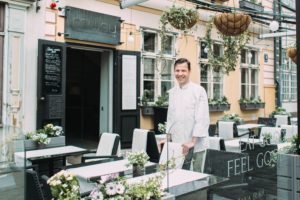
Kaspars Jansons
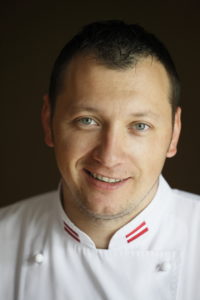
Maris Jansons
Amsterdam is known as “Venice of the North” because of its canals and Riga is known as “Paris of the North” because of its post-Communist culinary Renaissance. The pioneer of this Renaissance is Mārtīņš Rītiņš, who through his show on national television brought exotic ingredients from far off places to the Latvians and Latvian Kilometer 0 ingredients to tourists at his restaurant, “Vincents”, founded in 1994. Many younger chefs, I’ve nicknamed “Rītiņš Boys” here, trained under him. Two of them are Maris Jansons, the Executive Chef at “Bibliotēka No. 1, judged by The White Guide Nordic to be the second best restaurant in Riga after “Vincents”, and his former colleague and friend Kaspars Jansons, Executive Chef at “Muusu”, also mentioned in the guide and definitely worth a stop. “Live Riga” took us there for lunch on the first day of our tour. The rhubarb dessert pictured below was to-die-for.
I always begin my chef interviews with the question: Our tastes in food are closely connected to our childhood; what are your first memories of food?
Maris Jansons: Only after I turned 30 seven years ago did I realize the importance of childhood memories. My family and friends like to tell this funny story about me: that one day I went outside and sat on the terrace with a pan full of thinly sliced onions that I had just baked. They tell me that for a long time I liked to bake onions and only onions.
Kaspars Jansons: My first and most impressive memory is of my grandfather’s fruit orchard! As a small boy I used to spend my summers in the country with mother’s parents.
Are there any other professional chefs in your family?
Maris Jansons: No.
Kaspars Jansons: No, but I liked the taste of the food that my grandmothers and my maternal grandfather made for me. All three were excellent cooks.
I realize that Jansons, like Johnson in the United States, must be a common surname in Latvia, but are you related ?
Maris Jansons: No, but we are close friends. We worked together at “Vincents” for 7 years. I’m godfather to Kaspars’ son.
Kaspars Jansons: No, but we are close friends. We both started our careers at the restaurant “Vincents”. And we both worked there for many years together.
What are the differences between modern Latvian cuisine and the Kilometer 0 philosophy of other European countries? Is it perhaps that under Communism you were ruled by the USSR and had little to eat; then you wanted everything foreign that you hadn’t been able to have under Communism, and now you can be proud to be Latvian and of your products?
Maris Jansons: You’re correct. During Communism all Russia’s satellite countries had almost all the same foodstuffs. Of course there were some cultural and gastronomic traditions, but most of them were forbidden. For example, we Latvians were not allowed to celebrate midsummer night on June 23rd.
In 1991 Latvia gained her independence and in 2004 our commercial borders were opened. It was so exciting to be able to eat pineapples, avocado, shrimps, picas, pasta, tuna fish, Caesar salads etc. for the first time that we forgot to think about our Km. 0 ingredients until very recently.
Kaspars Jansons: It’s very interesting to see the differences between our gastronomic tastes today and those of many years ago! The kinds of products we choose now and those we “chose” before. I think now we want to help ours farmers and promote their products more that ever.
It says on your website that you and many other now successful chefs in Latvia worked under Mārtiņš Rītiņš at “Vincents”, what was that like? Who were the many others?
Kaspars Jansons: “Vincents” is the oldest pars has been the best restaurant in Riga for over 20 years now! It is very stressful but admirable to be the best restaurant for such a long time. Other “Rītiņš Boys” are Maris Jansons at “Bibliotēka No 1”, Ēriks Dreibants at “Restorāns “3” and “3 Paravu Restorāns Tam labam būs augt”, Ivans Šmigarevs at “Marčers” shop and café, and Jānis Zvirbulis, the Executive Chef at Hotel Bergs as well as many others around the world. After working at “Vincents” I went to the Hotel Bergs here in Riga , NOMA in Copenhagen, to the “Schwarzwaldstube” int he Hotel Traube Tonbach in Baiersbronn in the Black Forest, both with three Michelin stars, and to the “La Table de Gourmet” in Alsace with 2 Michelin stars. Last year after a two-year stint in Belarus, I returned to Riga.
Like Kaspars Jansons, you worked under Mārtiņš Rītiņš, what was that like?
Maris Jansons: It was an amazing time, an amazing experience! I was very young. We cooked the very first steaks available and held the first barbecues in Latvia. In 2000 we introduced sushi here. We worked very hard, but it was a school for life. We cooked for all of Europe’s top politicians and other V.I.P.s, movie stars, musicians etc. etc. who visited Latvia. After “Vincents” I opened cafés at the airport, a café and buffet at “Laima” chocolate factory, before starting to plan “Bibliotēka No. 1” very slowly.
Was he your mentor?
Maris Jansons: Yes, Mārtiņš taught us everything about what it meant to be a chef, from how to choose the best ingredients to the sacrifices we would have to make to reach the top, but also how to enjoy our profession.
Kaspars Jansons: Yes, Mārtiņš was like a father for all of us! Very demanding, but at the same time intelligent, creative, witty, and helpful. Above all, he taught me to love this profession and take pleasure in every dish I make.
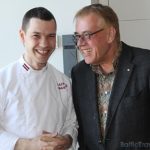
Kaspars Jansons with Rītiņš while working at “Vincents”
Wasn’t he the first chef to promote modern Latvian cuisine successfully?
Maris Jansons: Yes, he was. He bought, whenever possible, directly from Latvian farmers. However, “Vincents”’ cuisine has always been international and based on local recipes from all around the world. Whenever possible, Mārtiņš uses ingredients from Latvia, but that is not always possible, especially because of our climate with its short seasons. Nevertheless Mārtiņš chooses the best available ingredients no matter what and when.
Kaspars Jansons: Mārtiņš always brought many products from all over the world, that we in Latvia hadn’t seen until 1994 and might never have in ours lives if Communism hadn’t fallen. That meant that we could cook many dishes for first time. Not to mention that we still cook them.
Like Raimonds Zommers, another chef whose interview is forthcoming, you are on the board of Latvia’s Chefs’ Club? What are the Club’s activities?
Maris Jansons: The Club’s main mission is to popularize our profession, make people aware of what we do and then popularize Latvian cuisine here in Latvia and abroad. We support young chefs, hold competitions and other culinary events. We teach in schools and collaborate with our government to promote Latvian cuisine.
Why does Latvia not have a chapter of Les Jeunes Restaurateurs d’Europe? Is it because Latvia’s top chefs, like you, don’t usually own the restaurants where they work?
Maris Jansons: Probably. We are a small country and most of our businesses are small too. Except for very few, most chefs only started to own their own restaurants around 7 years ago, so that certainly means something. When I own my own restaurant, I’ll let you know.
Kaspars Jansons: There are some chefs in Riga who own their own restaurants, but at the moment it is very, very expensive to do so.
In another interview, you said there are only five suitable restaurants in the three Baltic States to merit a visit from Michelin critics. Which five?
Maris Jansons: “Vincents” and “Bibliotēka No. 1” here in Riga, “Noa” and “Alexander” in Tallinn, and “Sweet Root” in Vilnius.
Your restaurant is not a library, so why is it called “Bibliotēka”?
Maris Jansons: That’s a good question. We wanted to create a restaurant where its story comes before everything, is the most important aspect. A library is the best place to find stories about food and wine.
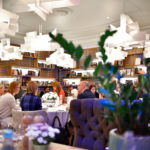
At Bibliotēka No. 1
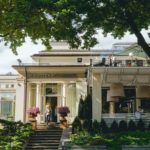
“Bibliotēka No. 1”
Why No. 1 after Bibliotēka?
Maris Jansons: Because you can’t call a restaurant “Ambulance” or “Police”. Its name needs to be qualified. Our restaurant is the first one at least in Latvia to be called “Bibliotēka”, hence the “No. 1”. Actually its full name is “Bibliotēka No. 1 Restorāns”.
What does the word “Muusu” mean in English? Kaspars Jansons: Ours.
Other Latvian chefs you admire?
Maris Jansons: Valters Zirdziņs, Kaspars Jansons, Mārtiņš Rītiņš, Atrtūrs Taškāns, Lauris Aleksejevs, Dzintars Kristovskis, and Ēriks Dreibants.
Kaspars Jansons: I’ve recently founded my own chefs club. Its name is “Gastro Scouts”. All my best friends belong!: Ainars Volodka, Māris Astičs, Kristaps Sīlis, Sergejs Siporovs, Reinis Stalbovs, to name some.
Non-Latvian chefs you admire?
Maris Jansons: My friend Dmitri Mägi from Estonia is Chef de Cuisine at “Eleven Madison Park” in New York. I’m very proud of him. Others are Estonian Dmitry Haljukov, the Swede Magnus Nilson, American Grant Achatz chef at “Alinea” in Chicago, the Brazilian Alex Atala at “D.O.M.” in São Paolo, and New Zealand-born Ben Shewry, chef at “Attica” in Melbourne.
Kaspars Jansons: Thomas Keller. I think he was the first chef to start to break away from classical recipes.
I’ve read that for food-lovers Riga is called “Paris of the Baltics”; do you think that is a fair or exaggerated nickname? Besides “Bibliotēka No. 1” where would you send food-loving tourists to Riga?
Maris Jansons: “Paris of the Baltics” is an appropriate nickname for Riga. I would send food-loving tourists to “Vincents”, “Valtera Restorāns”, “Muusu”, and Restorāns “3.
Kaspars Jansons: To “Vincents”, to me at “Muusu”, to “Valtera Zirdziņa” in the Old City, to the coffee roasting shop “Rosket Bean Rostery” on Miera Street, and “Marčers”, the best place in Riga for a gourmet lunch.
What are the essential qualities to be a top chef?
Maris Jansons: You have to work very hard everyday. You have to be charismatic and have the talent to figure out what your customers want, to psych them out. Everything else you can learn in about 10 years of experience.
Kaspars Jansons: You need to love what are you doing with all your heart.
What do you like best about your work?
Maris Jansons: I like to plate food. It’s the best part of my day, but it takes only about 3 minutes to plate a dish and then away it goes. Out of my hands!
Kaspars Jansons: I like to see and feel how the seasons change in my hands and in my dishes.
The least?
Maris Jansons: The long hours.
Kaspars Jansons: Money talks and sometimes
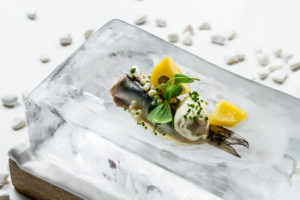
At “Bibliotēka No.1”
I need to make choices I’d prefer not to.
What’s your culinary philosophy?
Maris Jansons: Cooking is not only about the quality of ingredients; it’s also about the quality of ideas. Nothing is more motivating than a job well done.
Kaspars Jansons: “Best is beginning”.

At “Bibliotēka No. 1”
In a nutshell, how would you define your cuisine?
Maris Jansons: The best ingredients. If I use the very best ingredients, everything else flows along easily, continues automatically. Farmers are the heroes, not the chefs.
Kaspars Jansons: Finding the best ingredients and using them to make the best possible dishes.
Would you say that Kilometer 0 is a fair description of modern Latvian cuisine?
Maris Jansons: I don’t like the term “modern”. A think a fair description is “contemporary Latvian cuisine”. It’s not only a description of our food, but also of our customers and fellow citizens, who are coming together and recognizing the wealth and deliciousness of our indigenous food products. We are a free people for the first time in many centuries. We are in charge finally of our own history and destiny.
Kaspars Jansons: Never say modern, say contemporary!
Do you purchase your ingredients at the Central Market or directly from farmers?
Maris Jansons: I buy some products at the Central Market, but I mostly buy Km. 0 products from local farmers.
Kaspars Jansons: Not all, just small part. I think real farmers don’t have time to spend all day in the market. Real farmers have to work hard in their fields, on their farms.
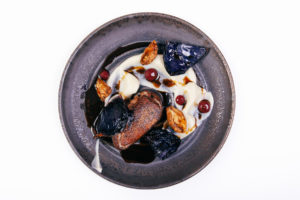
At “Muusu”
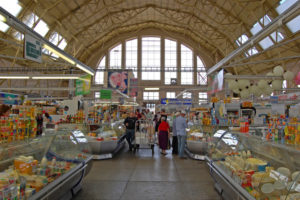
Inside the Central Market’s dairy pavilion
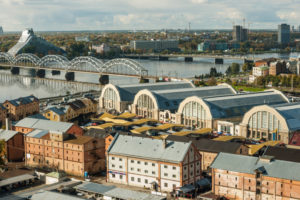
The Central Market’s four pavilions
Your opinion of restaurant guides?
Maris Jansons: Restaurant guides are important for keeping restaurants competitive and not resting on their laurels, for trying to be at their best everyday. It is essential for restaurants in Latvia to be cited in the White Guide Nordic. You and probably your readers know how important gastronomy is to travel.
Along with culture and history travel is about food and the best local dishes. In Latvia we want to promote our different local dishes the way other countries do. We don’t want to serve what everyone else does: tuna steaks and pasta with salmon.
Kaspars Jansons: I enjoy seeing how other chefs and I here in Riga keep improving.
What are your signature dish and other specialties?
Maris Jansons: I like to create desserts. “Beekeepers Joe” is my best dessert.
Kaspars Jansons: I like to make starters; they are delicious and a nice way to balance the tastes of each season.
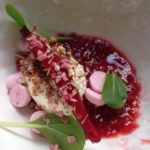
At “Muusu”
Why do Italian wines predominate your sommelier Jānis Gallis’s cellar?
Maris Jansons: Originally our concept was to buy the whole range of wines from one producer, but now we serve the wines not only of several producers in Italy but also in other countries.
Up to now you’ve told me about Maris and Kaspars Jansons the chefs; I’d like to know more about Maris and Kaspars Jansons themselves. For example, what are your favorite foods?
Maris Jansons: I love smoked fish when I’m at the seaside. I love fresh berries, which I pick with my family. I love my early morning espresso coffee when I’m traveling in the countryside by enduro and a gin and tonic after a crazy week.
Kaspars Jansons: I like finger foods, grilled meats, chicken, and fish, and desserts.
A Latvian dish you always ask your mother to make for your birthday?
Maris Jansons: Cottage cheese cake, with a slightly sweet jelly filling inside and cookies on the bottom. It’s delicious. You should try it.
Kaspars Jansons: Meat.
A dish you dislike?
Maris Jansons: One that’s made with no love, without passion. You can always tell.
Kaspars Jansons: Nothing, if it’s fresh and made correctly.
Your favorite drink?
Maris Jansons: Gin and tonic.
Kaspars Jansons: Cold water from a stream in the woods.
Your favorite color?
Maris Jansons: Light blue.
Kaspars Jansons: Green.
What is never missing from your refrigerator at home?
Maris Jansons: Milk for my morning coffee and dark chocolate.
Kaspars Jansons: Milk.
Your favorite ingredients and spices to work with?
Maris Jansons: Fresh and local ones especially rye bread. We traditionally make two desserts with rye bread: “rye bread ambrosia” and “rye bread soup”. Salt and pepper.
Kaspars Jansons: Fish. Black Telicheri pepper.
What are your hobbies?
Maris Jansons: I like to go on trips on my motorbike. I also like to fish, make movies and play the guitar. I like to do many things.
Kaspars Jansons: Cycling.
This interview is for both an American and an Italian magazine, have you ever been to the USA or Italy. If so, where?
Maris Jansons: I was in the USA twice. I worked at two summer camps for “Latvian” children teaching them how to make Latvian dishes. One was in Kalamazoo and the other in Malibu. On June 28th I’m going to Baltimore, where there will be a music festival for all the Latvians in the USA. I will be in charge of preparing the gala dinner for approximately 250 people.
In Italy I’ve been to a lot of places: last summer at Villa Tereze (www.terezehouse.com) in the Marche for a holiday and other times to Aprica for skiing.
Kaspars Jansons: No, I’ve never been to either but I’m going to Italy this year. I really admire Massimo Bottura.
Where do you like to go on vacation?
Maris Jansons: Japan is a dream destination for every chef.
If you hadn’t become a chef, what profession would you have chosen?
Maris Jansons: When I was younger, I worked for five years at a radio station as a DJ. So I would have chosen to stay a DJ or become a TV showman.
Kaspars Jansons: A teacher!!!
Do you have a pipe dream?
Maris Jansons: To open my own restaurant, and to travel, travel, and travel. Travel is an inspiration for life.
Kaspars Jansons: To invent a recipe for which I will always be remembered.
